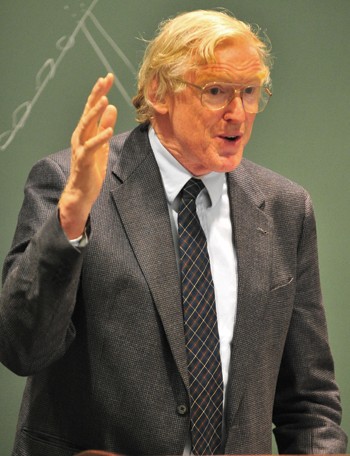
John Gaffney, professor of anthropology at the University of Notre Dame, speaks about the Middle East on Tuesday evening. (Stuart Palley)
Democracy does not fit well with Islamic ideals and will continually struggle to take hold in the Middle East. John Gaffney took this contra-American view in the Hesburgh lecture entitled “Lost In Translation? Bringing American Ideals to the Middle East” on Tuesday.
Gaffney is a professor of anthropology at Notre Dame University with extensive experience in research and field work in the Middle East. In his professional opinion on Middle Eastern and Islamic culture, he asserts that democracy is not a cultural fit because of religious ideals ingrained into Middle Eastern society.
“It is essentially trying to fit a square peg into a round hole,” Gaffney said. “American presence forcing a democracy is just as equivalent to an Islamic presence in America forcing a religious leader into the White House; it just doesn’t work.”
Gaffney cited a lot of history of the Middle East and demonstrated from where their ideals came. He stated that in the Islamic religious and political spectrum, both emerged from the same source, creating the rift with Western culture that can be seen today.
“Muslims have come to see religious and political activity as emerging from the same source,” Gaffney said. “All legitimacy stems from religion in the government, and one’s claim to superiority or power, if not rooted in religion, is not worthy of stable respect.”
The view that Muslim political leaders must have religious roots is because they must be answerable to God, similar to the coronation of an emperor by the Pope, Gaffney states. Gaffney asserts that this type of leadership, that from which the West spent centuries trying to get away, is perfect for the Middle East and its ideals.
Gaffney continued by discussing a popular theory about the clash of Western and Muslim ideals put forth by a Pakistani journalist.
“To Islamic people, saying that your leader is of Islamic faith is equivalent to saying he is a good leader, for Muslims equated morality and goodness with religion,” Gaffney said. “The Islamic world acknowledges the West as technologically and materially superior, but views us as religiously and morally impoverished and that this insertion of our ideals into their society is an attempt to wipe them of their religious richness.”
Gaffney showed that in the Islam world, a method of electing leaders in a free manner is possible through religion. It is about the cultivation of religion, Gaffney states, that an Islamic people can refine their religion and elect religious leaders to perpetuate the cycle. This works for their culture, and this imposition of American ideals will forever meet resistance no matter how large the military presence, he claims.
When asked how to begin to solve the problems and violence in the Middle East, Gaffney responded by saying, “No peace will ever come if people are forced against their will [or] culture.”
“If America were to step aside and not attempt to impose its Western ideals on the Muslim world and allow these people to chose their own path to their destiny, this will be a step of progress,” Gaffney said.








